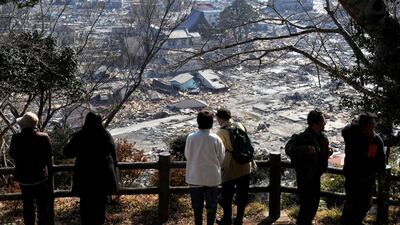Almost seven years after the Fukushima Daiichi nuclear power plant disaster, Japan finds itself at a turning point on energy policy.
In 2011, a magnitude 9 earthquake caused a huge tsunami that slammed into Japan’s main island of Honshu, devastating the Fukushima Daiichi nuclear power plant. Some reports put the number of dead at almost 15,900 people, some of whom died in the earthquake itself and the tsunami.
All Japan’s 48 reactors were shut down between 2011 and 2012. Five reactors have since resumed commercial operations after meeting revised regulatory standards. Twelve other reactors at six sites have been approved for restart, the Japan Atomic Industrial Forum said in November.
But a group advised by former prime minister Junichiro Koizumi is pushing for a bill calling for an “immediate halt” to Japan’s nuclear power sector to prevent a recurrence of the Fukushima disaster.
In a report last March, the US-based Institute for Energy Economics and Financial Analysis said Japan's energy challenges are delineated by sluggish economic growth, a shrinking population and declining electricity demand, down 11.5 per cent from its 2010 peak of 1,140 terawatt hours.
Before Fukushima, Japan had enough nuclear fuel to ensure nuclear power played an important role in long-term domestic production of electricity. Since Fukushima and the reactor shutdowns, the country has become deeply reliant upon imports of fossil fuel. This contributed to a reversal in trade balance from 30 years of surplus to a deficit that reached $116 billion (Dh425bn) in 2014, the IEEFA report says.
As total electricity generation drops, solar photovoltaic [solar PV] generation has the potential to account for 12 per cent of Japan’s electricity mix by 2030, up from 4 per cent at present.
Japan was the second largest installer globally of solar PV from 2013-2015. But with generous feed-in-tariffs that supported this expansion coming to an end, new policy support by the Japanese government will be required to perpetuate solar growth, the IEEFA report says.
While onshore wind development has been slow due to Japan’s lengthy approvals process for the limited suitable land available, significant and overlooked opportunities exist in offshore wind development, the IEEFA report says.
_______________
Read more:
Revealed: Inside Jordan's first nuclear research reactor
Russian-built Belarusian nuclear plant stirs concern
_______________
Mitsubishi Heavy Industries is currently researching and developing offshore wind technology as well as supplying offshore turbines via its joint venture with MHI Vestas Offshore Wind. IEEFA models 10 gigawatts of offshore wind in Japan by fiscal year 2030.
Assuming a much-needed policy push to increase solar and offshore wind capacity and factoring in the country’s probable electricity demand reduction, Japan’s total renewable energy share will reach 159GW by 2030, almost triple the 2010 capacity, the IEEFA report says.
In IEEFA’s model, this includes hydro and biomass, and depends on the Japanese government delivering on its COP21 pledge made as part of the 2015 Paris Agreement, the first universal, legally binding climate change deal.
Japan is dependent on fossil fuel imports and is the world’s largest importer of liquefied natural gas. Power generation is the largest consumer of gas, accounting for almost 70 per cent of consumption in 2014, the IEEFA report says.
In 2015, gas-fired electricity generation reached 39 per cent of Japan’s total, thereby forming a major energy security challenge for the nation, the IEEFA report says.
After a decade of rising LNG imports, including an 18 per cent post-Fukushima surge, 2016 saw a 2 per cent drop to 83 megatonnes. The decline is being driven by increasing renewable energy capacity as well as the few nuclear reactor restarts that have occurred so far, the IEEFA report says.
Further increases in renewable capacity and nuclear restarts will lower the utilisation rates of gas-fired generators, IEEFA report says.
Japan's Ministry of Energy, Trade and Industry tells The National that although domestic oil demand is on a downward trend, oil still accounts for more than 40 per cent of Japan's primary energy sources.
Compared to the amounts used for transportation and in the manufacturing industries, the amount of oil used as a power source is not large, the ministry says.
"Oil will continue to be used as an important energy source because it can serve as an alternative when other energy sources have been lost, given its high portability, well-developed nationwide supply network, and abundant stockpiles."

